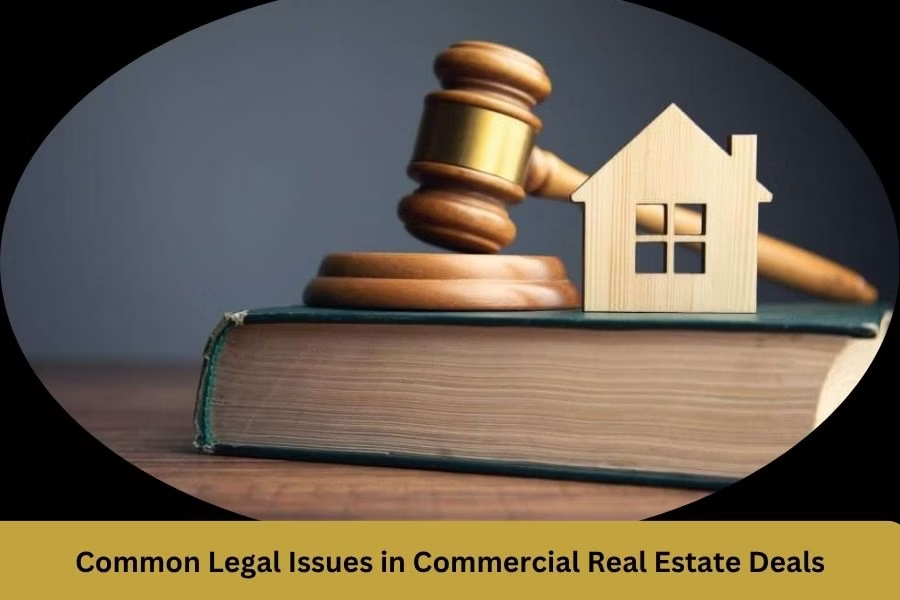Commercial real estate transactions are complex endeavors involving multiple stakeholders, large financial investments, and intricate legal frameworks. Whether buying, selling, leasing, or developing commercial property, both experienced investors and first-time buyers must navigate a landscape filled with potential legal pitfalls. Understanding these common legal issues can save time, money, and future complications.
The Real Estate Law Firm has been guiding clients through these transactions for years, ensuring clarity, compliance, and peace of mind. Below, we explore some of the most prevalent legal challenges in commercial real estate and how to address them effectively.
Need legal guidance? Explore our Commercial Real Estate services.
Title Issues and Ownership Disputes
One of the most critical legal aspects of a real estate deal is ensuring clear ownership. Title issues—like undisclosed liens, easements, encroachments, or previous claims—can delay or derail a transaction. A thorough title search and insurance are essential steps to verify rightful ownership.
The Real Estate Law Firm recommends engaging legal professionals early to conduct detailed title examinations and secure title insurance policies, providing buyers and lenders with protection against unforeseen claims.
Zoning and Land Use Conflicts
Zoning laws regulate how property can be used—whether for industrial, commercial, residential, or mixed-use purposes. Violating zoning regulations can result in fines, legal disputes, or the inability to operate as planned.
Before entering any commercial transaction, The Real Estate Law Firm advises clients to:
-
Check local zoning ordinances
-
Understand future zoning plans
-
Request zoning letters or land-use opinions
These steps help ensure the property is suitable for the intended use.
Environmental Concerns and Compliance
Environmental regulations often affect commercial real estate deals, especially properties used for industrial purposes or located near protected lands. Issues like soil contamination, groundwater pollution, or the presence of hazardous materials can result in legal liabilities and remediation costs.
Environmental due diligence, such as Phase I and Phase II Environmental Site Assessments, is crucial. The Real Estate Law Firm partners with environmental consultants to help clients evaluate risks and mitigate liability before purchase.
Contractual Disputes
Every commercial real estate deal hinges on contracts—purchase agreements, lease agreements, construction contracts, and more. These documents must be precise, enforceable, and protect the interests of all parties involved.
Common contract-related issues include:
-
Vague terms or conditions
-
Failure to include contingency clauses
-
Unclear timelines or deliverables
-
Breach of contract
Our legal team at The Real Estate Law Firm meticulously drafts and reviews commercial contracts to prevent ambiguity and reduce the risk of litigation.
Talk to our contract lawyers before signing anything.
Financing and Loan Complications
Securing financing for a commercial property is more complex than residential lending. Misunderstandings between borrowers and lenders, misrepresentation of financial data, or last-minute changes in loan terms can lead to disputes.
The Real Estate Law Firm works with both borrowers and lenders to ensure all loan documents are accurate, complete, and compliant with federal and state laws. We help protect your interests by flagging problematic clauses and ensuring smooth closing procedures.
Lease Agreement Challenges
Commercial leases differ significantly from residential ones and are highly negotiable. They may include terms related to rent escalations, maintenance responsibilities, tenant improvements, and early termination clauses.
Both landlords and tenants face risks if leases are not carefully negotiated or clearly understood. The Real Estate Law Firm offers lease analysis, negotiation support, and dispute resolution services to ensure favorable and fair agreements for all parties.
Failure to Disclose Material Defects
Sellers are legally obligated to disclose known material defects, such as structural issues, water damage, or pest infestations. Failure to do so can result in lawsuits for misrepresentation or fraud.
We at The Real Estate Law Firm help buyers demand and interpret disclosure documents and advise sellers on how to stay compliant with disclosure laws to avoid post-closing liability.
Permitting and Code Violations
Before a commercial property can be used or renovated, owners often need permits for construction, signage, occupancy, and more. Failure to obtain proper permits can lead to costly delays and legal consequences.
The Real Estate Law Firm assists clients in:
-
Navigating local permitting processes
-
Understanding building and safety codes
-
Correcting violations before or after purchase
This ensures that projects can move forward without legal barriers.
Boundary and Survey Discrepancies
Legal descriptions in deeds don’t always match physical boundaries, leading to disputes with neighboring properties. Encroachments or overlapping easements can affect usability or property value.
We always recommend a full survey prior to closing. The Real Estate Law Firm works with licensed surveyors and handles boundary dispute resolutions through negotiation or litigation if necessary.
Taxation Issues
Commercial property owners are subject to various taxes, including property taxes, capital gains, and transfer taxes. Misunderstanding these obligations can lead to unexpected costs or legal trouble.
The Real Estate Law Firm offers tax guidance in collaboration with CPAs and tax attorneys to ensure that your transaction is financially sound and legally compliant.
Conclusion
Commercial real estate deals are fraught with potential legal challenges, but with the right legal counsel, they can be executed smoothly and profitably. From title verification to lease negotiations and zoning compliance, every step requires thorough attention to legal detail.
The Real Estate Law Firm stands ready to guide you through the complexities of your commercial transaction with diligence, transparency, and legal expertise. Partner with us for your next real estate endeavor, and safeguard your investment from avoidable legal risks.
Speak with our legal team about your next deal.
Frequently Asked Questions (FAQs)
-
What are the biggest legal risks in commercial real estate deals?
Title issues, zoning conflicts, and environmental liabilities are among the most common risks that can impact the legality and profitability of a deal. -
How can I verify that a property has a clear title?
A title search and title insurance are essential. The Real Estate Law Firm provides comprehensive title review services to confirm ownership legitimacy. -
What is a Phase I Environmental Site Assessment?
It’s a report that identifies potential or existing environmental contamination liabilities. It’s often required before commercial property transactions. -
Are commercial leases negotiable?
Yes. Most commercial lease terms, including rent, responsibilities, and duration, are negotiable. Let The Real Estate Law Firm assist in ensuring favorable terms. -
What happens if I discover a defect after closing?
You may be entitled to compensation if the seller failed to disclose known defects. Legal recourse depends on the situation and the documentation involved. -
Can I use a commercial property for residential purposes?
Not unless zoning laws allow mixed-use or residential use. Always verify with zoning authorities or consult The Real Estate Law Firm before purchasing. -
What are easements, and why do they matter?
Easements allow others to use part of your land for specific purposes (e.g., utility access). They can affect your ability to develop or sell the property. -
How do I protect myself during a commercial property purchase?
Engage experienced legal counsel, conduct due diligence, and ensure all documents are carefully reviewed and drafted. The Real Estate Law Firm can help with all these steps. -
Do I need a real estate attorney for a lease agreement?
Absolutely. Commercial leases can be complex, and having a lawyer review or draft them protects you from unfavorable terms and potential disputes. -
What legal documents are essential in a commercial real estate transaction?
Key documents include the purchase agreement, title documents, zoning verification, lease agreements (if tenants exist), environmental reports, and loan documents. The Real Estate Law Firm ensures all these are in order for a secure transaction.




